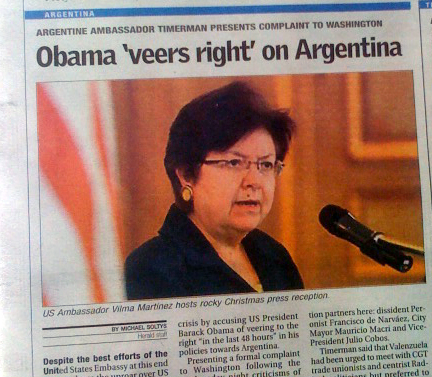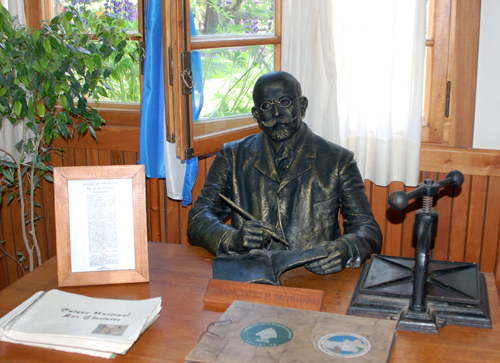It would be mad for me to claim to know anything about the countries whose mountains, parks and hospitality I've been enjoying. The appropriate analogy for what I convey here might be impressions of the United States garnered by a non-English-speaking tourist dropped into South Lake Tahoe who then visited Yosemite Valley. Not deep or necessarily meaningful. But here goes.
The world watches and waits on Obama, anxiously.

Headline from the English language Buenos Aires Herald on the day we arrived.
The old maxim, "when the U.S. sneezes, Latin America catches pneumonia" still holds, or at least people fear that it does.
Knowing that politics in other people's countries is not our business, we engaged in only one substantive political conversation. This was with an Argentinian who had lived in the United States in the late 1970s and early 1980's, in exile from the rightwing military's (and CIA's) Dirty War of torture and "disappearance" against leftists and students. He volunteered that when Obama was elected, people had had great hopes that the United States had changed. But he fears that the new administration's support for the anti-democratic coup in Honduras in June and the sham elections there in November has emboldened right wing elements throughout the continent.
Our new friend, on learning that my partner is a student of the implications of the U.S. adopting torture as policy under the Bush regime, spoke proudly of Argentinians' twenty year effort to prosecute their own torturing generals. "It took a long time, but the result is worth it."
Badly behaved tourists.
 Somewhat to my surprise, there is a set of tourists much more resented in Chile and Argentina than the relatively few oblivious North Americans. People from both countries volunteered their disgust with the behavior of back-packing Israelis. "They are not well-brought up; they leave garbage all over."
Somewhat to my surprise, there is a set of tourists much more resented in Chile and Argentina than the relatively few oblivious North Americans. People from both countries volunteered their disgust with the behavior of back-packing Israelis. "They are not well-brought up; they leave garbage all over."Hence the sign at left from an Argentinian park.
I have no idea whether this sentiment contains elements of European anti-Semitism, stems from repulsion against Israel's treatment of Palestinians, or simply reflects that traveling Israelis actually do act boorishly when wandering the world. This was something I had not encountered previously.
Argentinians and Chileans don't much like each other
However little Patagonians may like various foreigners who descend on their countries, they save their real distrust and dislike for each other.

Once upon a time this Chilean sheep farm on Last Chance Fiord was a grand estancia, though land reform and the contemporary economy has reduced its owners to welcoming tourists for magnificent lamb barbecues.

But the current Senor Eberhard proudly recounts that when Argentinians tried to move in during the last century, his grandfather continued to fly the Chilean flag, defending the land.
Chileans we met seemed to feel that neighboring Argentina was "the boondocks." Their border crossing bureaucrats were strict and thorough, a little reminiscent of the paranoid U.S. TSA, in fact. Argentina seemed "laid back" in comparison.

A bronzed figure of Francisco "Perito" Moreno sits behind a desk in an information center of Argentina's Los Glaciares National Park.
Meanwhile, Argentinians described Chile as aggressively grasping. Mr. Moreno, pictured above, is a hero for having surveyed the Patagonian hinterland in late 19th century and successfully staking out Argentina's claim to the peaks that became this most astonishing park.

In contemporary El Calafate, the tourist town that serves as Argentina's gateway to its Patagonian wonders, people had very immediate concerns. Chileans, enjoying a stronger economy, are "buying up all the land." Don't know if this is true, but I have enough experience of urban gentrification to know what ugly feelings arise when property becomes unaffordable to its present residents ...
1 comment:
You really are a born journalist. I learned more about southern Chile and Argentina in that one post than I knew before in my life, and I've read about the area (including Bruce Chatwin) a number of times.
Chile sounds like snotty coastal California, with Argentina being ranching hicks like the Central Valley, though I am sure their centuries-old resentments are all their own.
My experience with Israeli tourists is not good, so I don't know if the answer is #1, #2, or #3 or all of them together.
Post a Comment